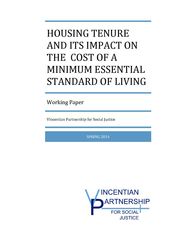Housing Tenure & its impact on the cost of a MESL MESL Working Paper
Issued: April 2014

Download
Summary
This paper explores the impact that housing tenure has on the cost of a minimum essential standard of living for four households types with children.
The paper, which solely focuses on the cost to the household, first examines the four household types in situations of employment and analyses how an identical household's minimum income standard is affected by housing tenure. For the four households in employment the Minimum Income Standard (MIS) is calculated for each tenure type and the difference in the MIS between the two tenure types is analysed.
The paper then examines the same four sample households in situations of unemployment and demonstrates the impact that housing tenure has on identical households wholly reliant on social welfare. The adequacy of social welfare transfers is assessed for households in each tenure type, including Rent Supplement for those unemployed and living in the private rented sector.
This paper draws attention to the impact that housing tenure has on the cost of a minimum essential standard of living and the subsequent Minimum Income Standard required. The high cost of accommodation in the private rented sector and the need for earnings significantly higher than the national minimum wage demonstrates not only the value of a social housing system and the benefit that incurs for those able to access it, but also the need for such a system for low income earners, who would be unable to meet the full cost of private rented accommodation from their own resources.
The paper also demonstrates that Government support for housing, either by providing social housing or subsidizing the cost of accommodation in the private rented sector, does not necessarily ensure that households dependent on social welfare will be able to have a minimum essential standard of living. What any individual or household is able to afford very much depends not only on their income, but also their other minimum essential outgoings. Therefore, while there clearly is a need for a social housing system, further consideration needs to be given to the relationship and interaction between housing, income and social welfare.